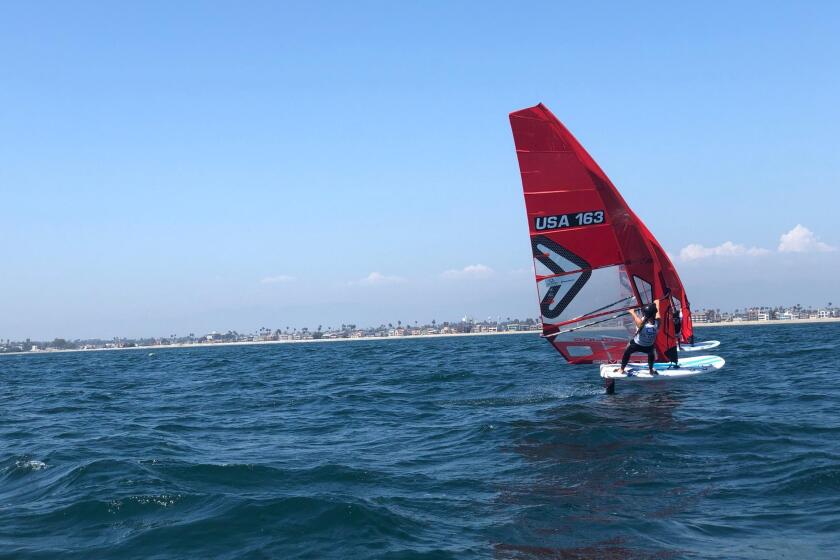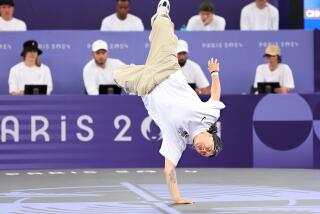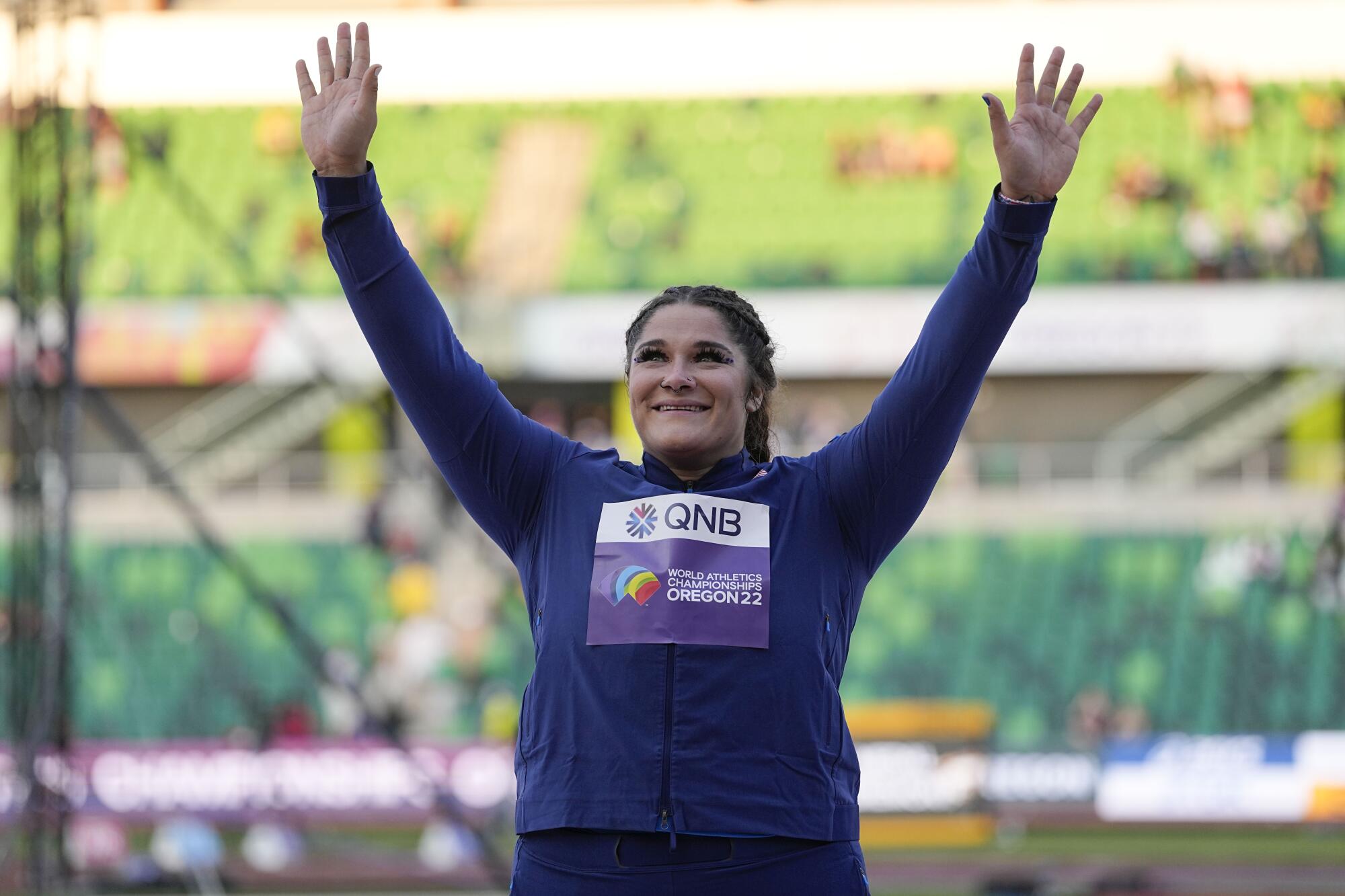
- Share via
EUGENE, Ore. — The unusual part for Chase Ealey on Saturday evening wasn’t that she threw the shotput with her eyelids covered in dots and broad brushes of red, white and blue makeup.
That part came later.
“I don’t always cry it off into oblivion,” Ealey said, “and have people having to fan my face.”
The occasion owed to something else equally as unusual happening: a U.S. woman winning the gold medal at the world outdoor track and field championships. Before Ealey’s win with a first-throw distance of 67 feet, 2¾ inches, a U.S. woman had never even claimed silver, the previous high-water mark a trio of bronzes.
Ealey punched the air with both fists after her first throw. Two hours later, after silver medalist Lijiao Gong of China failed to pull ahead after her sixth and final attempt, Ealey covered her eyes with those hands as tears and makeup ran. It was not only the first gold for a U.S. woman in that event at any outdoor worlds meet, but the first by a U.S. woman in any event at this particular worlds. In the coming days, the Americans expect that number to grow significantly and continue a U.S. resurgence in the sport that has been building for two decades.
Since the U.S. women claimed 16 medals at the 1984 Los Angeles Olympics, their medal count at the Summer Games began a downward trajectory. Just 16 years later, at the Sydney Olympics, they collected only three — their fewest since 1976, and nine fewer than the U.S. men collected in Australia.
Four years later, a generation of new stars experiencing their first Olympics, including sprinters Sanya Richards-Ross, Lauryn Williams and Allyson Felix, helped double that number to six medals in Athens. The young runners were part of a core that brought home nine medals from the world junior championships two years earlier and “saw the possibilities and opportunities” ahead of them, Richards-Ross said.
“It just started kind of this avalanche, if you may, of, ‘We’re here, we see what’s possible, we can continue to be great,’” she said.
By 2016 in Rio de Janeiro, the U.S. women matched the record count of 16 medals from Los Angeles 32 years earlier. But it was their 15 medals earned in Tokyo last year that was perhaps even more notable — the first time the U.S. women had earned more Olympic track and field medals than their male counterparts, who earned 10.
Those 10 total medals and two golds — won by shotputter Ryan Crouser and the 1,600-meter relay — were each the fewest ever by the U.S. men at an Olympics.
The men wasted little time toward a rebound, with Fred Kerley, Marvin Bracy-Williams and Trayvon Bromell sweeping the 100 meters Saturday night under a setting sun over Hayward Field. U.S. women, meanwhile, said that this stage doesn’t represent a chance for redemption but reaffirmation.
“The men are talented, they’re great, but the women, we’ve seen world records fall within two weeks back to back of each other,” said Kendall Ellis, the former USC star who won a 1,600 relay gold medal in Tokyo and will run the 400 at these championships. “We’ve seen records break at [Olympic] trials and then again at the major championship. That’s something that hasn’t been done.
“We’re seeing the youngest Olympic 800 gold medalist [Athing Mu], and then come back and get another gold medal in the 4x4 [relay]. The women are doing things that have never been seen before in the sport of track and field and I think we’re going to continue to do such amazing things. This is just the start of it all.”
Mu is 20. Sydney McLaughlin, who has reset her world 400-meter hurdles world record last month, is 22. Raevyn Rogers and Gabrielle Thomas, who won Tokyo bronze in the 800 and 200 meters, respectively, are 25. Raven Saunders, the shotput silver medalist in Tokyo who isn’t competing in Eugene, is 26.
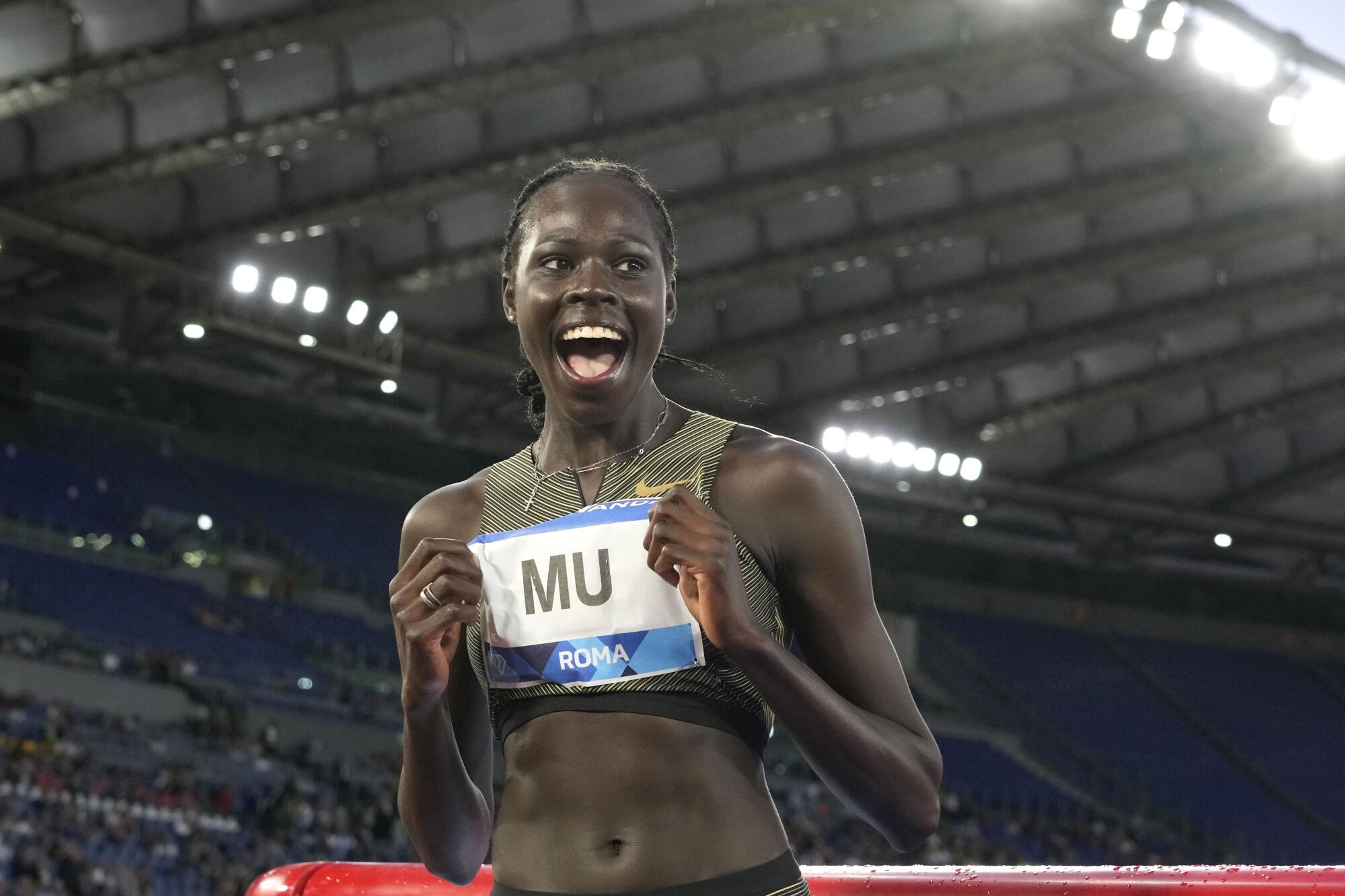
Even athletes who view the sport at its most granular level cautioned that identifying clear factors for the U.S. women’s rise was difficult, if not impossible, because of the sport’s fragmentation. Dozens of training groups each abide by their own methods and strategies.
Yet not all were surprised by the string of recent successes on global stages, calling the stress of competing at an Olympics or world championships relatively easier than the U.S. championships, with its ruthless competition for only three qualifying spots. Earning her roster spot weighed on distance runner Cory McGee in Tokyo.
“The clearest thought going into the semis [in Tokyo] was, ‘If you don’t make this final then you took it from another American,’” McGee said. “There’s a level of, I guess, duty. I think that’s a great thing because I’m very aware of the fact that the girl who got fourth or fifth is fully capable of making an Olympic final on a good day.”
Several athletes spoke of drawing inspiration from older stars. Some pointed to the examples of Shannon Rowbury and Jenny Simpson, who excelled in distance disciplines in which U.S. women had not always factored. Some athletes have lasted so long to have begun their career as an upstart and ended as a standard-bearer. Richards-Ross was a veteran by the 2012 London Olympics, when her 400-meter gold was one of 14 medals won by the U.S. women.
“When we talk about ‘representation matters,’ I think 2012 was a huge eye-opener for a lot of young girls who were just starting out in the sport,” she said.
In recent years, U.S. women such as Felix have leveraged their fame to advocate for changes, including the way shoe companies, the dominant sponsors in the sport, structure contracts and payouts for women who pause their careers to have children. There are a number of issues still to be worked out. Since she had seen the WNBA reach wider support in recent years, Rogers said she felt disappointed the 15-medal haul from Tokyo hadn’t been discussed more often.
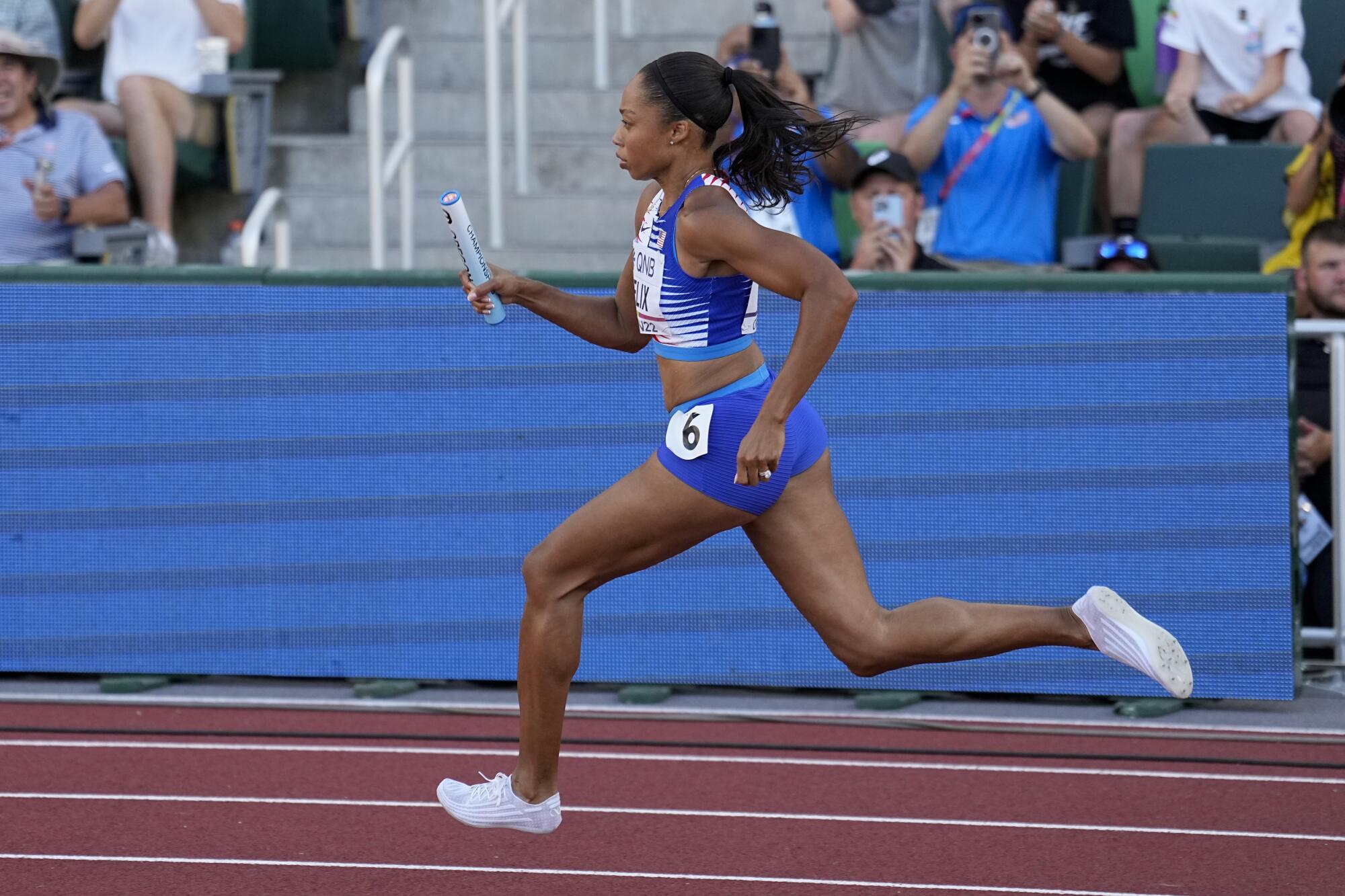
Yet among those issues, the women didn’t cite an opportunity gap between men and women. Some shared that they knew of many women who earned larger contracts than men.
The top finishers at this month’s world outdoor championships will earn from $8,498,000 in prize money — and men and women earn equal amounts. Gold medalists such as Ealey earn $70,000, silver earns $35,000 and bronze medalists $22,000, with amounts decreasing to $5,000 for eighth place. Athletes who set a world record in Eugene can win a $100,000 bonus.
The Diamond League, the sport’s elite circuit that runs from Doha, Qatar in May to Zurich in September, also awards equal prize money ranging from $10,000 for winning an event at a meet to $500 for eighth. At the most recent U.S. Olympic team trials, payouts for each discipline ranged from $10,000 for first to $1,000 for eighth.
“The beautiful thing about track and field is men and women get equal prize money, equal opportunities to compete,” said Emma Coburn, a 10-time U.S. champion steeplechaser. “From that aspect, I have always felt like I have an equal opportunity to succeed.”
The West Marine U.S. Open Sailing Series is in Long Beach during the weekend, training competitors on the same waters that will host the 2028 Olympics.
The opportunity to succeed at a world championships held in the U.S. excited Ellis, who called her Tokyo experience bittersweet. In her first Olympics, she won gold with a 1,600 relay leg. But atop the medal stand, amid a cavernous, empty stadium, it was impossible to hear the internet cheering.
She spoke with her parents afterward on FaceTime. It wasn’t the same as a hug, like the one Ealey shared after her final throw, once she’d crossed the track toward a section holding her mother, stepfather, boyfriend and training partner. She grabbed an American flag, and a new rumble of applause greeted her with every section she passed during her victory lap.
“I think we’re just getting started,” Ealey said. “Don’t underestimate us.”
More to Read
Go beyond the scoreboard
Get the latest on L.A.'s teams in the daily Sports Report newsletter.
You may occasionally receive promotional content from the Los Angeles Times.

